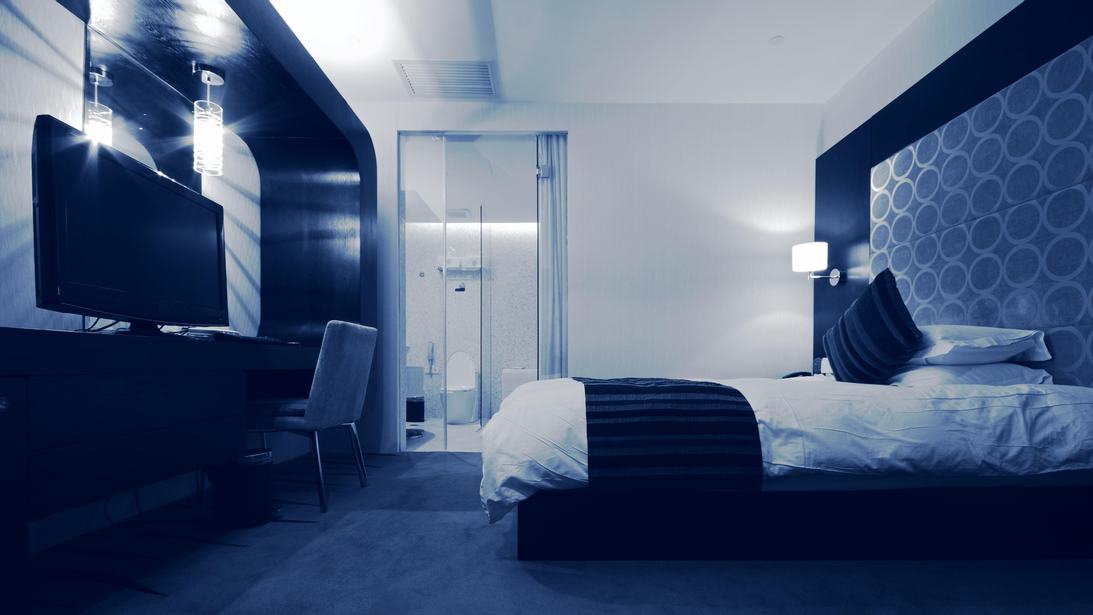Staying in a Hotel? Big Brother may be Watching you Smoke
Smoke detectors just got smarter.

Ever been tempted to smoke up in a non-smoking hotel room or short-term rental? It’s definitely not advisable, not only because the smoke you leave behind lingers for days in the dust, sheets and the air. Whether you know it or not, there’s any number of air detector technologies which can differentiate betwee cannabis and tobacco smoke. They can tell exactly when you’ve been smoking it as well, which may result in a visit from a hotel employee or an extra cleaning fee charge and a bad review for you.
And these products have been on the market for at least a decade. The Lebanon, NH-based FreshAir made headlines when it announced its technology back in 2014, and this summer, the California-based WYND Technologies, Inc. announced the release of its own monitor, named Sentry, which can also detect vaping and excessive noise. Both aim their technologies towards not only the hospitality market, but multifamily rental units, student dorms, or anywhere else where the management would rather not have people partaking indoors.
How the Technology Works
The technologies act like classic smoke detectors you may have in your home or apartment. However, they won’t emit a sound when a smoke or vapor is detected. Rather, an alert will go off on an app held by the building/hotel manager or short-term rental host. FreshAir’s technology incorporates a molecularly-imprinted polymer technology which responds to molecules within cigarette and cannabis smoke. WYND goes it one better with its claims to detect cannabis and nicotine vaporization as well. In addition, WYND also sets of an alert whenever noise levels in the unit or house go above a certain decibel level.
These companies market their devices based on the post-COVID emphasis on cleanliness to lure paying customers back to hotels. A 2014 study cited by the CDC estimates that 2.5 million people have died since 1964 due to exposure from secondhand smoke. Plus, remediating a non-smoking room can be quite costly, requiring the host or hotel staff to scrub down all the hard surfaces, bringing in an ozone generator and leaving the unit unoccupied for days at a time.
And even “third-hand smoke,” when people enter a space where people have been smoking, can have ill health effects. Carcinogens from smoke can linger, and lead to one extra cancer case per 1000 people, according to research by York University. Notably, however, this research only looked into cigarette smoke, not cannabis.
What this means is that the hosts are going to stick you with the bill if they catch you smoking in their unit when you shouldn’t be, and they now have ways to determine whether you are or not. Dismantling a smoke detector will also set off an alarm, and the service can also create incident reports which can be filed along with a claim to the manager or rental host’s insurance company as well. So if you end up with a heftier bill as a result, they will have a convincing case against you, whether you’re in a legal state or not.
A New Sheriff in Town
In June, 2022, Airbnb officially codified their ban on party house rentals, a policy that up until June was only temporary. While the 16-person cap has been lifted, it does mean that what had been up until the beginning of the pandemic a laissez-faire environment with short-term rentals is responding to greater community pressure. In the meantime, hotels have a mandate to please their repeat customers, which often account for most of a hotel’s business.
What this means for responsible and informed cannabis consumers is to stay aware of the spaces that are not their own. Just because you want to inhale a different vapor or smoke doesn’t mean the family coming in after you does. And you might end up with a heftier bill than you bargained for.
